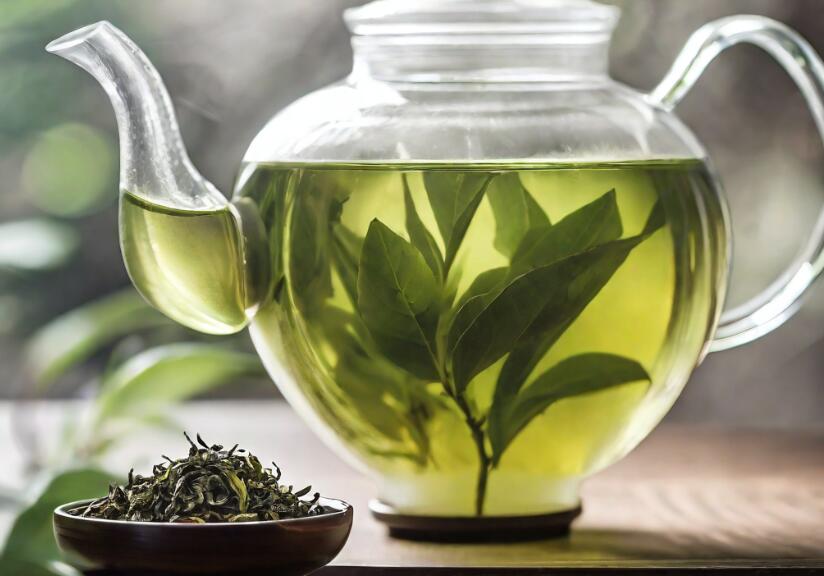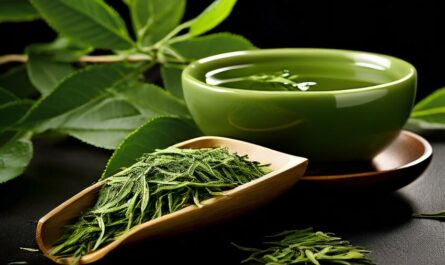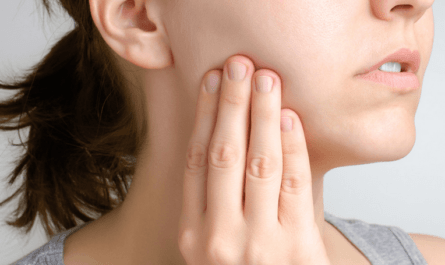Are you wondering if your cup of green tea is giving you more than just a refreshing break? Surprisingly, this ancient brew does contain caffeine, though it’s often less than what’s found in coffee. Our article dives into the details of caffeine content in green tea and how it compares to other popular drinks, helping you make informed choices about your intake. Discover the buzz behind your favorite tea with us!
Key Takeaways
- Green tea has caffeine, but not as much as coffee. A cup of green tea has 20 – 45 milligrams of caffeine.
- The type of green tea and how you make it can change how much caffeine is in your drink.
- If you don’t want caffeine, you can choose decaffeinated green tea or herbal teas without caffeine.
- Caffeine in green tea can help keep you awake and might be good for your health, but too much may cause sleep problems.
- Pick a lower-caffeine green tea like Sencha if you are careful about how much caffeine you have. Drink 1-3 cups a day for the best results.

What is Green Tea?
Green tea is a type of tea made from the leaves of the Camellia sinensis plant, which have undergone minimal oxidation during processing. It is known for its light and refreshing taste, as well as its potential health benefits.
Does Green Tea Contain Caffeine? How Much Caffeine Is in Green Tea?
Yes, green tea does contain caffeine. However, the caffeine content in green tea is generally lower compared to other beverages like coffee and black tea. On average, an 8-ounce cup of green tea contains around 20-45 milligrams of caffeine, whereas the same amount of coffee can contain 95-200 milligrams of caffeine.
The caffeine content in green tea can vary depending on factors such as the type of tea leaves used, the brewing time, and the water temperature. If you are sensitive to caffeine or trying to limit your intake, you may opt for decaffeinated green tea, which has had a significant portion of its caffeine removed.
Understanding the basic components of green tea
Green tea is made from the leaves of a plant called Camellia sinensis. The leaves are loaded with natural parts that are good for you, like antioxidants. These antioxidants help keep your body healthy and can fight off damage from bad stuff called free radicals.
To make green tea, people pick fresh leaves and quickly heat them by pan-frying or steaming them. This step stops the leaves from turning brown and keeps their green color. It also keeps all the good things in the leaves ready to go into your cup when you brew it.
Different kinds of green tea have different tastes because of where they grow and how people turn them into tea.
How green tea is produced?
Green tea is made from the leaves of the Camellia sinensis plant. The process starts with harvesting the leaves, usually by hand, to ensure the highest quality. After picking, the leaves are quickly heated to prevent oxidation and preserve their green color and flavor.
This step can be done through steaming or pan-firing. Then, the leaves are rolled and dried to remove the remaining moisture. Finally, they are sorted into different grades and packaged for distribution.
Types of green tea and their characteristics
There are different types of green tea, each with unique characteristics and flavors. Some common types include sencha, matcha, gyokuro, and hojicha. Sencha is known for its grassy flavor and is the most popular type of green tea in Japan.
Matcha is a vibrant green powder made from finely ground tea leaves, offering a rich and earthy taste. Gyokuro is a shade-grown tea with a sweet and mellow flavor due to its unique cultivation process.
Hojicha stands out with its roasted aroma and reddish-brown color, making it a soothing and nutty option.
Each type of green tea has varying levels of caffeine content. While sencha contains moderate caffeine levels, matcha can have higher amounts due to consuming the whole leaf in powdered form.
What is Caffeine and What Does It Do?
Caffeine is a natural stimulant found in various foods and beverages, including green tea. It affects the central nervous system, providing a temporary boost in energy and alertness.
Understanding the effects of caffeine is essential to understanding its presence in green tea.
How caffeine affects the human system
Caffeine affects the human system by stimulating the central nervous system, making a person feel more alert and awake. It blocks the action of adenosine, a neurotransmitter that relaxes the brain and makes you feel tired.
This leads to increased heart rate, improved mood, and enhanced cognitive function.
The effects of caffeine on the human body can vary from person to person depending on factors such as weight, tolerance levels, and overall health. Understanding how caffeine works in our system is crucial for making informed choices about its consumption.
The effects of caffeine on the body
After being absorbed into the bloodstream, caffeine travels to the brain where it blocks the neurotransmitter adenosine. This leads to increased neuron firing and the release of other neurotransmitters like dopamine and norepinephrine, which can improve mood, energy levels, and various aspects of brain function.
Additionally, caffeine can also increase metabolism and enhance physical performance by breaking down body fat, and releasing fatty acids into the bloodstream that are used as fuel for exercise.
Caffeine can have a stimulating effect on the central nervous system while blocking sleep-inducing chemicals in the brain. It may lead to improved memory, mood regulation, faster reaction times, and overall cognitive function.
Sources of caffeine
Caffeine is naturally found in various plants, including coffee beans, cacao seeds (chocolate), and tea leaves. It can also be artificially produced and added to certain beverages, medications, and food products.
When it comes to teas, black tea typically contains the highest caffeine content followed by oolong tea and then green tea. However, the exact amount of caffeine in green tea can vary based on factors such as the type of green tea, brewing time, and water temperature.
Comparing green tea’s caffeine content with other common caffeinated beverages
Green tea generally contains less caffeine compared to coffee and energy drinks but more than herbal teas. An 8-ounce cup of green tea usually has around 20-45 milligrams of caffeine, while the same amount of black tea ranges from 40-70 milligrams, and coffee can contain anywhere between 95-165 milligrams.
However, it’s essential to note that these values can vary based on factors such as brewing time and brand variations.
Understanding the caffeine content in different beverages helps make informed choices about your daily intake. It’s important to consider individual tolerance levels when comparing these options and their potential impact on sleep patterns or overall health.

Factors that influence caffeine content in green tea
The caffeine content in green tea can vary based on several factors like the type of tea plant, the part of the plant used, and how the leaves are processed. The younger leaves and buds tend to have higher caffeine content than older leaves.
Additionally, factors such as water temperature, steeping time, and the number of times the leaves are infused can affect caffeine levels in brewed green tea.
Furthermore, environmental conditions such as climate, soil quality, and altitude where the tea is grown also impact the caffeine content in green tea. Moreover, different varieties of green tea may naturally contain varying levels of caffeine due to genetic differences within the tea plants.
Health Implications of Caffeine in Green Tea
Exploring the potential health benefits and risks associated with the caffeine in green tea. Read on to discover how caffeine in green tea can impact your overall well-being.
Health benefits associated with the caffeine in green tea
Green tea’s caffeine carries health perks. It heightens alertness and concentration. Green tea also boosts metabolism, aiding in weight management. Additionally, its antioxidants fight free radicals, reducing the risk of chronic diseases like heart disease and cancer.
The caffeine in green tea may enhance physical performance during exercise by mobilizing fatty acids for energy use.
Potential risks and side effects of caffeine in green tea
The caffeine in green tea can cause potential side effects such as increased heart rate, anxiety, and digestive issues in some individuals. It may also disrupt sleep patterns if consumed late in the day.
Overconsumption of caffeinated green tea can lead to dependency and withdrawal symptoms when one stops consuming it suddenly. It’s important to be mindful of your caffeine intake from green tea, especially if you are sensitive to its effects or have pre-existing health conditions.
Understanding the impact of caffeine in green tea on your body is crucial for making informed decisions about consumption. Moving on, let’s explore the bottom line of caffeine in green tea and recommendations for its consumption.
The bottom line on caffeine in green tea
Green tea contains caffeine, which can provide a gentle energy boost without the jitters commonly associated with coffee. The amount of caffeine in green tea varies depending on factors like brewing time and the type of green tea leaves used.
For those looking to limit their caffeine intake, opting for decaffeinated green tea is an option, although it still contains trace amounts of caffeine. It’s important to consider individual tolerance levels when consuming caffeinated beverages like green tea, especially if sensitive to its effects.
The caffeine content in green tea offers a mild pick-me-up and numerous health benefits but should be consumed mindfully, particularly by those sensitive to its effects or aiming for reduced caffeine intake.
Recommendations for consumption
Enjoy green tea in moderation to reap its potential health benefits while managing caffeine intake. Opt for lower-caffeine varieties like Japanese sencha or white tea if you are sensitive to caffeine, aiming for 1-3 cups per day.
Consider decaffeinated green tea options if you want to avoid caffeine altogether without compromising on the soothing and antioxidant properties of green tea. Remember that personal tolerance varies, so pay attention to how your body responds and adjust your consumption accordingly.
Conclusion
Green tea contains caffeine, but the levels can vary depending on factors such as the type of green tea and how it’s brewed. Generally, a cup of green tea contains about 20-30 milligrams of caffeine, which is much lower compared to coffee.
FAQs
1. Is the caffeine in green tea different from the caffeine in coffee?
The amount of caffeine is different. Green tea has less caffeine than coffee.
3. Can you find green tea without any caffeine?
Yes, there are special decaffeinated green tea options that have no or very little caffeine.
4. Will drinking green tea affect how well I sleep?
Because it has some caffeine, if you drink a lot of green tea it could make sleeping hard for some people.
5. What are some good things about drinking green tea even though it has caffeine?
Green Tea is healthy because it’s full of good stuff that can help your body stay strong and work well.






